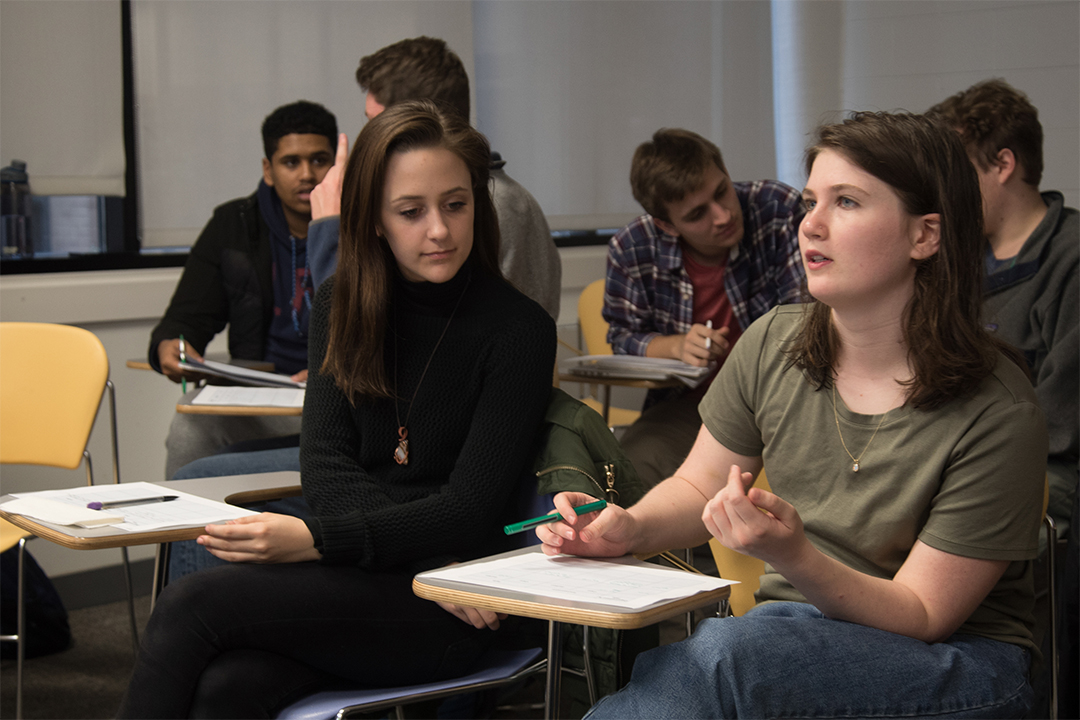When sophomore Carley Christerson enrolled in Columbian College’s Public History class last fall, she was looking forward to a curriculum that included discussions on urban renewal and the shifting political tides of city life. But what she got was much more—a class that helped her apply her studies to the professional workplace through field trips, internship opportunities and in-classroom workshops with representatives from the Center of Career Services.
“I was totally taken by surprise at that component,” said Christerson, a history major. Several of her classmates parlayed their enhanced job skills into internships, she said, while Christerson herself has taken a broader view of what a history degree means in the workplace. “This class opened up a whole new world of occupational history for me,” she said. “I’m now aware of hundreds of career options that I didn’t even know were available to me through history.”
The Public History class is one of several offered this year through a pilot curriculum dubbed the Engaged Liberal Arts (ELA). Like Dean’s Seminars and Sophomore Colloquia, which are offered exclusively to CCAS students, ELA classes target sophomores and juniors looking for focused study on specific areas of interest but with one big difference: the introduction of a professional development element.
“There’s a lot of buzz these days around the value of a liberal arts degree,” said Columbian College Dean Ben Vinson III, who spearheaded the new ELA initiative. “These courses are meant to mitigate that notion through the connection of scholarship with practice-oriented learning enterprises and professional success.”
Working with Career Services, ELA faculty introduce career skills that complement academic instruction. In some cases this means turning over their classrooms several times a semester to Career Service representatives for presentations on skills assessments, professional communication and networking. Other times, faculty have adapted existing classes or created new ones that integrate professional development directly into their curriculum. For example, in the Public History class, Associate Professor of History Christopher Klemek had his class networking with working historians like museum curators, and Professor of Clinical Psychology Christina Gee invited alumni into her psychology class to explain how they are putting their liberal arts degrees to work.
The ELA initiative launched in the fall with classes in four disciplines—biology, psychology, history and music. Two more classes were added in the spring: Gee’s Clinical Psychology class and Geography Professor Elizabeth Chacko’s Migrants and the City.
“By merging the academic with the professional, we want students to think earlier about their preparation for being in the workforce,” said Chacko, who also serves as the CCAS associate dean of undergraduate studies. “That may mean getting an internship or improving your professional skills or learning where your talents and strengths lie. These classes provide concrete, practical professional development without losing sight of our academic mission.”
According to Assistant Provost for University Career Services Rachel A. Brown, approximately 80 students enrolled in the fall courses. In post-class surveys, students said they now felt better able to convey the relevance of their academic experiences to employers. Prior to the classes, 73 percent agreed or strongly agreed that they could articulate the skills they acquired through their liberal arts education. That figure rose to 86 percent after completing an ELA course, with strongly-agree respondents increasing from 10 percent to 19 percent.
“We are trying to help students see the value of their liberal arts education and how it can impact their development both in the classroom and in professional experiences,” Brown said. She noted that, at the end of each course, students are required to create a written and video “professional pitch” on how the class relates to their career goals. “In a sense, we are trying to get them to convey the Engaged Liberal Arts in their own words.”
When junior biology major Priya Brahmbhatt enrolled in Professor of Biology Keith Crandall’s Introduction to Bioinformatics last fall, she was initially skeptical of the professional development component of the course. But the skills Crandall incorporated into his science seminar—resume building, networking and interviewing—were immediately helpful to Brahmbhatt when she applied to research-oriented internships. “It definitely made me more aware of the importance of professional development and the impact it makes on my career trajectory,” said Brahmbhatt, who hopes to attend medical school after graduation.
For sophomore political science major Gordon Ehrlich, meeting professional historians in Klemek’s class—including a former top-level National Security Agency officer, researchers at the Office of the Historian at the State Department and curators at Ford’s Theatre—offered him a window into possible career options. “Not only did [the professional development components] help me better understand the technical aspects of applying to a job, but I also gained helpful insights from people who have spent an entire career in the field of public history,” he said.
While Columbian College and Career Services will continue to evaluate the program after the semester, Brown has a checklist of ideas to build on the lessons learned in the pilot program, including expanding the number of disciplines and courses, increasing alumni involvement and enhancing student awareness of the Engaged Liberal Arts brand. Still, the initial offering, she said, was an important step in the right direction. “Through Dean Vinson’s commitment and the endorsement of our faculty partners, we are making a strong statement to our students: Professionalism and professional development are a vital part of the liberal arts.”


